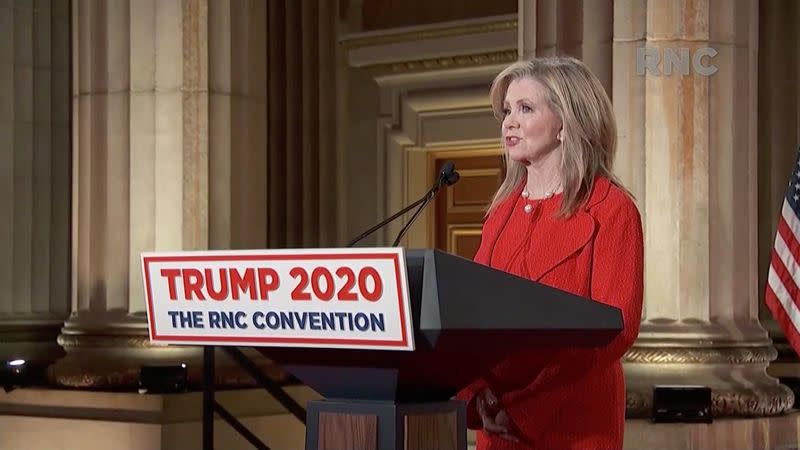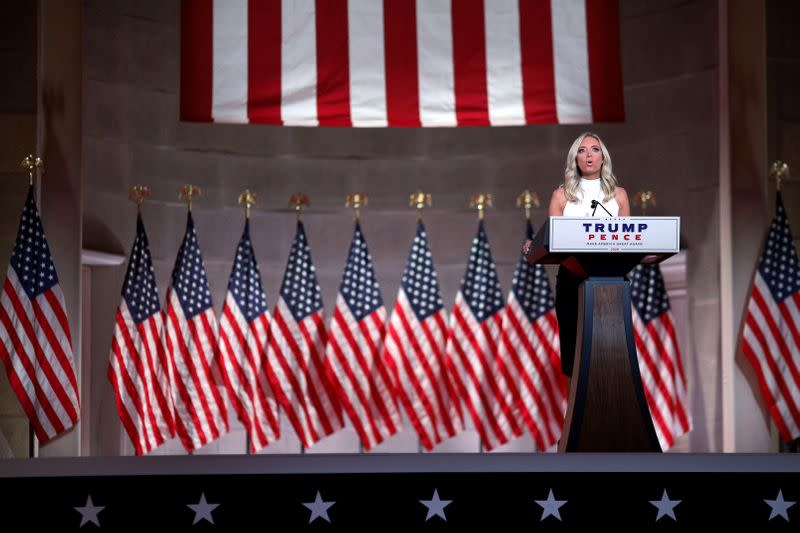Four takeaways from Day Three of the Republican National Convention
By Joseph Ax
WASHINGTON (Reuters) - Vice President Mike Pence headlined the third night of the Republican National Convention, as speakers praised President Donald Trump's support for "heroes," including law enforcement, the military and healthcare providers. Here are four takeaways from Wednesday's program:
BIDEN THE RADICAL?
As they have done throughout the week, Republicans sought on Wednesday to portray Democratic nominee Joe Biden either as sympathetic to radical socialists or as a figurehead for their cause.
"Joe Biden would be nothing more than a Trojan horse for the radical left," Pence said.
"Joe Biden, Kamala Harris and their radical allies try to destroy these heroes, because if there are no heroes to inspire us, government can control us," Senator Marsha Blackburn said, accusing Biden and his running mate of attacking law enforcement.
It is not clear if the ominous warnings - which the Trump campaign has amplified for months - will stick.
In the crowded Democratic presidential race, Biden ran explicitly as a moderate alternative to liberal stalwarts such as Senators Bernie Sanders and Elizabeth Warren, particularly on healthcare, although he has shifted left on some issues since securing the nomination in a bid to unify the party.
Republicans have tried to tie Biden to policies backed by some progressives, such as banning fracking and decriminalizing illegal border crossings. But Biden does not support those positions.
ONLY ONE VULNERABLE SENATOR ONSTAGE
The most vulnerable Republican senators up for re-election – Colorado’s Cory Gardner, Maine’s Susan Collins, North Carolina’s Thom Tillis and Arizona’s Martha McSally among them – have been absent from the convention, in what may be a nod to Trump’s lukewarm approval ratings.
But Joni Ernst, the senator from Iowa who is locked in a tough battle with Democratic challenger Theresa Greenfield, made a prime-time appearance on Wednesday, delivering remarks in front of a tractor and hay bales in her home state.
The speech was politically innocuous – Ernst focused on Trump’s assistance for farmers during the coronavirus pandemic and the administration’s response to destructive storms.
But it stood out mostly because of the absence of her fellow vulnerable legislators, who face a difficult balancing act: creating some distance between themselves and an unpopular president, while avoiding angering his passionate base of supporters.
WOMEN FOR TRUMP
Two of the most visible women in Trump’s administration, senior adviser Kellyanne Conway and White House Press Secretary Kayleigh McEnany, spoke about their private interactions with Trump in an effort to humanize a president who has rarely shown empathy in public.
McEnany offered a deeply personal story about her decision to undergo a preventative mastectomy, describing how Trump called her afterward – a gesture she characterized as supporting “an American with a pre-existing condition.”
In fact, the Trump administration will try this autumn to persuade the U.S. Supreme Court to invalidate the Obama-era Affordable Care Act, which bars health insurers from canceling coverage for people with pre-existing conditions.
Conway, who is leaving the White House soon to focus on her family, portrayed Trump as a champion of women, giving him credit for making her the first woman to oversee a successful presidential campaign.
“I have seen firsthand, many times, the president comforting and encouraging a child who has lost a parent, a parent who has lost a child, a worker who lost his job, an adolescent who lost her way to drugs,” Conway added. That is a side of Trump that most Americans have not seen after national tragedies, such as mass shootings or the coronavirus pandemic that has killed more than 177,000 Americans.
LAW AND ORDER
Within the first 15 minutes of the convention's third night, one of the main themes of the evening was already apparent: "law and order."
That is the message Trump has delivered, repeatedly and forcefully, throughout months of civil unrest following the May police killing of George Floyd, a Black man in Minneapolis. He has called protesters 'thugs' and 'anarchists' and deployed federal agents to cities despite opposition from local leaders.
Two of the evening's early speakers, South Dakota Governor Kristi Noem and U.S. Senator Marsha Blackburn of Tennessee, accused Democrats of trying to undermine police while allowing violence to consume their cities.
"From Seattle and Portland to Washington and New York, Democrat-run cities across this country are being overrun by violent mobs," Noem said, although most of the protests since May have been peaceful. "The violence is rampant – there's looting, chaos, destruction and murder."
Several speakers, including Pence, inaccurately suggested Biden supports "defunding the police," a position he has rejected.
"The violence must stop, whether in Minneapolis, Portland or Kenosha," Pence said. "We will have law and order on the streets of this country for every American - for every race and creed and color."
That was one of the few references to the increasingly combustible protests in Kenosha, Wisconsin, after a Black man, Jacob Blake, was shot in the back by police officers.
On Wednesday, a white teenager was arrested in connection with the fatal shooting of two protesters in Kenosha. Wisconsin's lieutenant governor told MSNBC the suspect was apparently a militia group member who "decided to be a vigilante and take the law into his own hands and mow down innocent protesters."
The speeches were in stark contrast to the Democratic convention last week – albeit before the Kenosha unrest began – when multiple speakers proclaimed that "Black Lives Matter." Floyd's name was not mentioned during Wednesday's Republican program.
(Reporting by Joseph Ax; Editing by Soyoung Kim and Peter Cooney)




